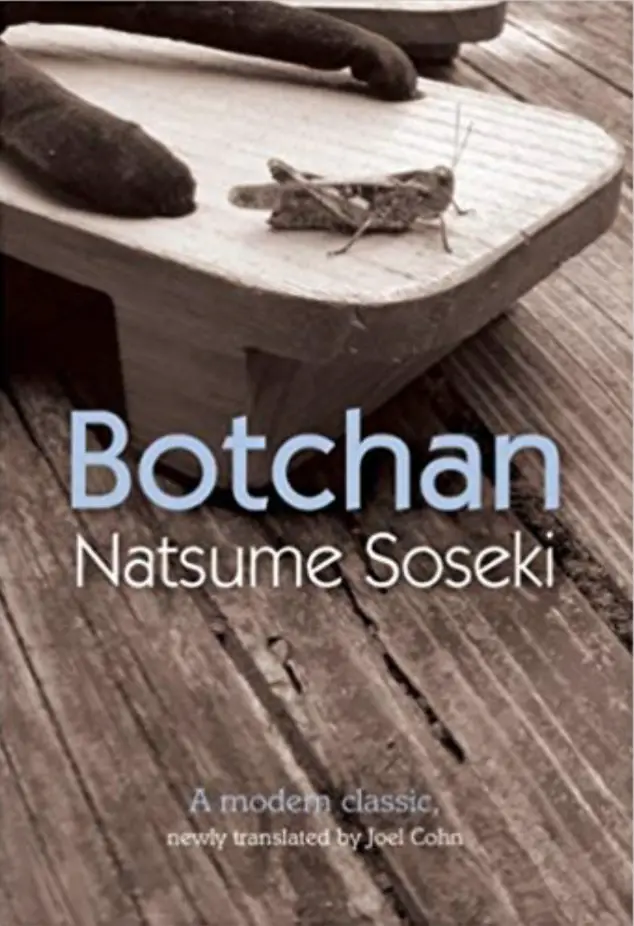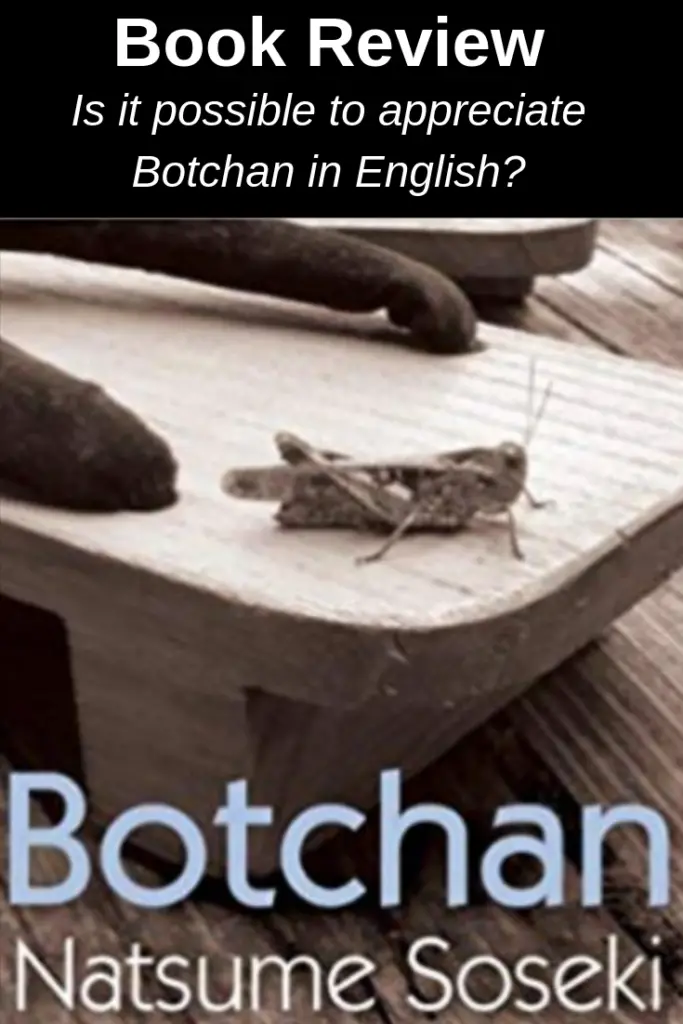Is it Possible to Appreciate Natsume Sōseki’s “Botchan” in English?
Botchan by Natsume Sōseki was written in 1906 and is widely considered to be one of the most read and best loved of all Japanese novels. I’ve read Botchan several times over the past few years. And I must confess that each time I finish it I ask myself “Why?” Why is it one of the most loved Japanese novels? The novel was enjoyable enough. It was a fun and reasonably fast-paced read, the narrator’s voice was quirky and arresting: but I’ve read other great Japanese novels, specifically Kokoro, also by Sōseki, which I consider to be a far greater literary work. Even the scholars seem to agree with me. The translator of my edition, J Cohn, says that Botchan is rough around the edges from a literary perspective, and it offers “few hints of the psychological and philosophical depth that distinguish Natsume Soseki’s later novels”. So my question remained. “Why?”

I can understand some of the reasons it’s popular
Character and Narrative Style
Even though I had some questions about why Botchan is considered one of the “most loved Japanese novels,” it was always obvious why it was popular. The narrator’s character, and his narrative style are interesting and refreshing. According to Cohn, Botchan’s narrative voice is “striking,” it’s “sometimes choppy but always vivid, direct, and outspoken”. This can be seen in the passage after the Principal tells him about his expectation of teachers.
There was no way I could do what this Principal was expecting…Did he really think that anyone of such distinction was going to come all the way out to some country town like this for forty yen a month?… If the assignment was so demanding, they should have explained exactly what was involved before they’d hired me. I don’t like lying, so there was no way out of it: I just had to face the fact that I’d come here based on a misapprehension, and make up my mind to give up the job and head for home straight away.
A type of wish fulfilment
Botchan’s direct nature and his frankness of speech can be seen as a form of wish fulfilment for the reader. The wish that the reader, like Botchan, was able to speak their mind to their superiors. Especially in Japan’s rigid social hierarchy, what employee doesn’t sometimes want to tell their boss to “shove the stupid job,” when there is a disagreement about some issue or other. This idea of wish fulfilment always reminds me of the popularity of the show Hanzawa Naoki, about the banker who promises “baigaeshida,” (double payback), to the managers who treat him badly.
His forthrightness in stark contrast to other characters
Furthermore, Botchan’s forthrightness is seen in stark contrast with the other characters in the novel. When trying to get Botchan onto his side, Yoshikawa tells him:
‘Yes, the students are really happy that you’ve come to our school. But all the same, there are various circumstances that have to be taken into consideration…’
‘“Various circumstances”? What do you mean?’
‘Well, it’s all a bit complicated, but you’ll see it clearly enough for yourself by and by.’
It sometimes seems as though Botchan is the only one speaking plainly and truthfully in a world full of misleading characters and deception. In this way, Botchan’s straightforward nature and his seeming relentless pursuit of the truth makes him likeable and refreshing to the reader.
But why is it so popular?
Despite these positives, I still couldn’t understand why this novel was so highly thought of. I just couldn’t see it.
The answers to some of my questions came when I found this article. Case Study of Comparative Modern Japanese Literature English Translation: Sōseki Natsume’s Botchan by Tokunaga Mitsuhiro. The purpose of Tokunaga’s study is to examine “to what extent it is possible to translate into English Botchan‘s narrative style…”. This is a difficult task considering the dialects that play off each other in the novel. Botchan’s “crisp colloquial speech of Tokyo” versus the slower dialect of rural Shikoku. But more than that, this article pointed out some of the difficulties of translating some of the “arresting wordplay” and nicknames in the novel. This article gave me some insight into what I might be missing.
The framing story with Kiyo
The main plot of the novel concerns Botchan, born and raised in Tokyo, working in a middle school in rural Shikoku. However, the story is framed by the story of Botchan’s relationship with Kiyo, his family’s elderly maid. It was clear that this framing story was important in some way, but I was never able to figure out how, or what the author intended. After reading Tokunaga’s article, I believe that the answer may be held in words that were largely left out of the English translations. I’ll give you a few examples.
The importance of the nickname “Botchan”
“Botchan” is the title of the novel and the nickname that Kiyo gives the narrator. The word “botchan” is used in numerous ways in Japanese. It can be used “to express a measure of respect mixed with fondness for and intimacy with the subject.” And at other times “it carries a mildly dismissive tone.” I was surprised to discover, from Tokunaga’s article, that the term “Botchan” is used several times in the novel in the original Japanese by people other than Kiyo. Specifically by the other teachers in the school. In one instance Noda remarks about the narrator, that he is “a real Tokyo character. Still just a youngster, but he does like to talk tough.” The original Japanese for this passage includes the word “Botchan.” “Ano otoko mo beranmee ni nite imasu ne. Ano beranmee to kitara isamihada no botchan dakara aikyou ga arimasu yo”. Here Noda uses the word “Botchan” in its more negative sense.
Differing views of the narrator
I realise now that the author is presenting the reader with various views the character and leaving it to the reader to decide which is true. Kiyo uses the term “Botchan” as a term of respect, but the narrator interprets it in a negative way. He states, “What was even more ridiculous was the way she still called me Botchan.” The omission of the term “botchan” from some parts of the translation means that the non-Japanese reader cannot grasp that different views of the term “botchan” are being presented. They can see the positive side of the term from Kiyo, but are unaware that the term is also being used negatively throughout the novel.
The difficulty of translation
It’s easy to see the bind that the translator is in. The Japanese term “botchan” is unknown to his English speaking audience. Even if he managed to find an English term that covered the nuances of the Japanese word, something I believe is impossible in itself, it would still be difficult for the English reader to relate the term to our narrator’s identity as a “Botchan”.
The English reader misses the contrasting dialects and wordplay
Another thing that the English reader misses is the enjoyment of the contrasting dialects and wordplay in the novel. What doesn’t come through in the English is the uniquely Tokyo dialect of the narrator and the ways in which this contrasts with the rural dialect of those around him. Tokunaga states, “The contrast between the Matsuyama dialect, typified by a slow, dull voice, and Botchan’s way of speaking is intended to capture the fascination of readers.” This again, is something that is difficult to show in translation. So difficult in fact that the translator of my edition decided to retain the Japanese (specifically Matsuyama) phrase “na moshi.” This is in order to demonstrate that there is a regional difference in the way they speak.
Well, umm, when you talk so fast it’s hard to understand, umm, could you slow down just a little bit if you don’t mind, na moshi.
This, however, leads to one of my favourite passages in Botchan. When he is criticising his students about how they speak to him.
And who do you damned jackasses think you are sticking that stupid na moshi on the end of everything when you’re talking to a teacher? It just makes you sound mushy-that’s all it’s good for!” That ought to show them who’s boss, I thought—but they came right back with “Na moshi isn’t the same as mushy, na moshi.” It was hopeless—they couldn’t stop saying “na moshi” even if they tried.
A different view of the novel
The discovery of Tokunaga’s article has allowed me to see that there is complexity to Botchan that cannot be reached through an English translation. It has shown me the novel in a different light, and while I still can’t give any opinion on its status of “best loved Japanese novel”, it has encouraged me to ganbarimasu with my Japanese studies in the hope that I can one day read it in the original Japanese.


Lost in translation. That’s also the name of a Good Japan movie.
Thanks Tony.
Yes, I enjoyed “Lost in Translation” although I haven’t seen it for a while now. Have you read any Japanese novels? I’m struggling to think of what I would recommend to start with. Probably not “Botchan”.
That might be another post idea.
Perhaps it would be something like Haruki Murakami’s “Norwegian Wood.” Although I’ve read a cool one recently called “The Housekeeper and the Professor” by Yoko Ogawa.
Such an interesting article. I would like if can do more reviews and recommandations of Japanese literature.